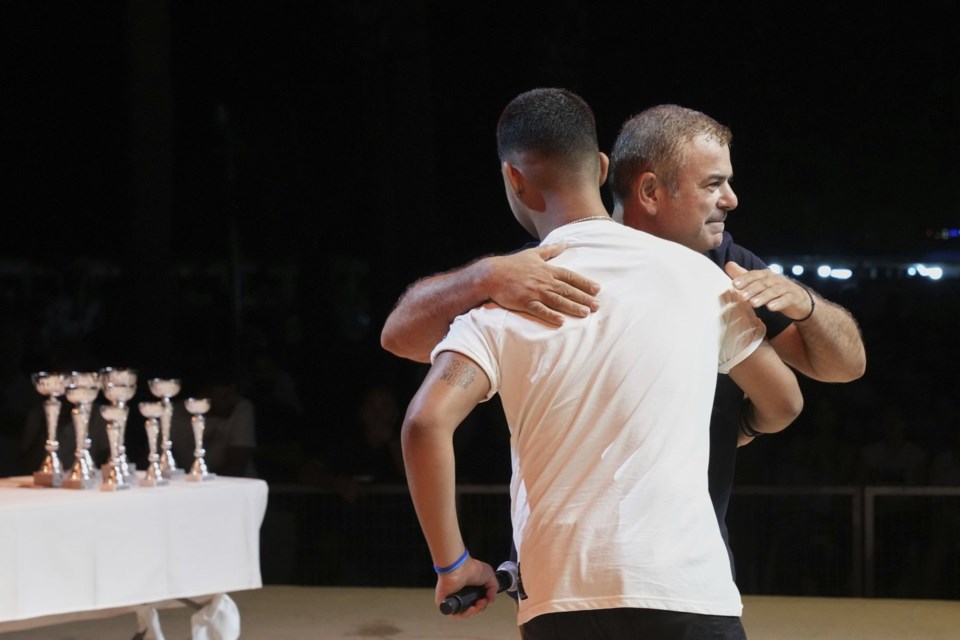LARNACA, Cyprus (AP) ã Lyrical duelists in Cyprus spit rhymes in head-to-head contests, keeping alive a tradition known as ãtsiattistaã that emerged centuries before the likes of Kendrick Lamar and Drake.
Konstantinos Christou Grilias and Adamos Peratikos are among a new group of poets in this Mediterranean country who battle it out live on stage to the rhythms of the lute and fiddle. The battles are fierce, but you won't find any Kendrick-Drake style beef. Tsiattista made UNESCOãs list of Intangible Cultural Heritage in 2011.
The similarities with American hip-hop diss songs and battle rap are many: two duelists using their wits and turns of phrase to boast how superior they are, giving opponents a schooling in an onslaught of lyrical beatdowns. It's complete with assertive gestures and the hands-behind-the-back patience of the poet waiting to pounce.
ãEven if youãd been a paramedic, Iãd send you to hospital with a heart attack,ã Peratikos told one adversary ã a line with more snap in the Cypriot Greek dialect, whose syntax is akin to ancient Greek. Grilias dissed his opponent as a lightweight and a laughingstock.
The audience of hundreds along a seaside promenade murmured in approval.
Tsiattista battles which have been around since at least the end of the 19th century, are undergoing a bit of a revival, thanks to performers like Grilias and Peratikos.
ãWe urge other kids who like it to come along to safeguard this institution,ã said Peratikos, 41. ãThe goal isnãt about awards, the goal is to keep tradition alive.ã
The 44-year-old Grilias said heãs never really delved into the world of Kendrick Lamar or Jay-Z.
ãHonestly, Iãve never listened to rappers. They told me that they battle in their own language, in their own way,ã Grilias said as he prepared for a tsiattista duel at the peak of a festival for the Orthodox Christian Pentecost.
ãRappers donãt know where Cyprus is," he added.
The new group of performers, known as tsiattistaes, started to replace the older generation about 15 years ago at the premier competition in Larnaca during the annual Pentecost festival known as Kataklysmos, said ethnomusicologist Nicoletta Demetriou, who is director of the island nationãs Music Archive.
The new generation includes women, though few participate because of lingering social exclusion, Demetriou said.
The current tsiattista format of a two-verse rhyme with a total of 15 syllables was developed in the late 18th to early 19th century, evolving from the introduction of the rhyming verse to the Greek-speaking world in the 15th and 16th centuries, Demetriou said. It draws on a tradition of poets matching wits from the times of Pericles in ancient Greece.
The structure and musical accompaniment are simple, so that the rhymes are clear and understandable for both the audience and the adversary.
Contests can address a range of themes, but the underlying premise is to determine whoãs the best at the diss.
ãItãs usually a fight, meaning ãIãd clobber you, kill you, bury you,ã Grilias said. ãBut I believe the public likes more a bit of humor, too.ã
For contestants, it's about who shows up ready, can stay cool and make the fewest mistakes in front of a crowd.
ãTruth is, youãre stressed, youãre under pressure," Grilias said, and ãthe person who can best handle this has the advantage.ã
One useful strategy is guessing how to get into your opponentãs way of thinking, predicting possible responses to your lines, Peratikos said.
He dismissed AI technology as incapable of coming up with effective rhymes in the Cypriot Greek dialect.
ãThere are words that weãve heard but we donãt even know, so thereãs no way artificial intelligence does,ã Peratikos said.
At the end of a long night of battling, Grilias and Peratikos finished fourth and fifth, respectively. A judging panel composed of men and women determined the winners. The two contestants took their places in stride.
ãWeãre all friends, thatãs whatãs important,ã Grilias said.
Menelaos Hadjicostis, The Associated Press



